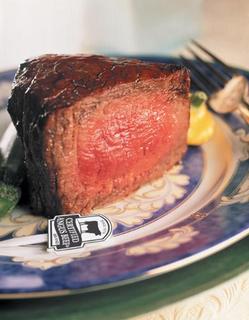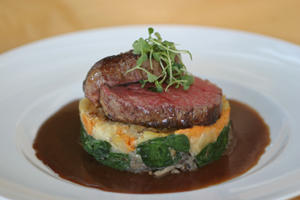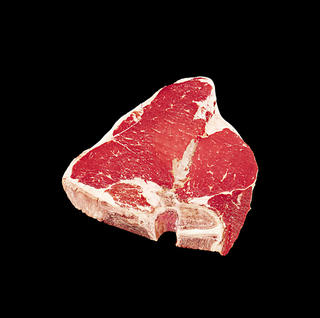



Ruth's Chris has been in the news quite a bit recently, with an IPO last month. This month, the formerly-New Orleans-based restaurant chain is in the news because Katrina forced the corporate headquarters to move permanently to Orlando, as detailed two days ago by Eric Dash in the New York Times:
...last Wednesday, not long after the levees burst in New Orleans, the top executives of Ruth's Chris Steak House gathered here in the lobby of the downtown Orlando Embassy Suites for an hourlong, soul-searching meeting.
As the executives debated whether to operate out of temporary quarters in another city while keeping their headquarters just outside New Orleans or to relocate permanently elsewhere, they decided that there were simply too many unknowns about the future of the city where their nationwide chain of 88 restaurants got its start.
...
Just three months after Ruth Fertel, its founder, mortgaged her house for an $18,000 loan to buy the Chris Steak House in 1965, Hurricane Betsy stormed through the Gulf Coast and cut off electricity in New Orleans. Not wanting to spoil thousands of pounds of beef, she cooked steaks over a gas stove while her brother served them to victims and relief workers who flocked to her restaurant. Later, those same people came back as customers.
But that storm did not overwhelm New Orleans the way Katrina did. Nor did it pose the same challenge to Ruth's Chris, now a newly public company with a responsibility to shareholders it has never before known. Indeed, only last month Ruth's Chris was celebrating its initial public offering as the largest restaurant chain to do so since Domino's Pizza started trading in 2004.
...
the bigger question facing the company is whether leaving New Orleans at its time of greatest need - something outsiders say that Ruth Fertel, who died in 2002, would have never done - will come back to haunt Ruth's Chris, particularly when its new headquarters is in Orlando, known for its suburban sprawl and dozens of bland food outlets. "When they give you a start, you kind of owe it to the city," said Brad Brennan, a member of the family that owns Brennan's Restaurant and Commander's Palace, a small New Orleans-based company with restaurants in Las Vegas and Houston, too. Mr. Brennan vows to return as soon as he can. "Payback is staying your ground," he said, "and employing the people that want to remain there and want to be employed."
Mr. Miller vigorously defends the company's decision. And he argues that with half of his employees in the area without homes and current prospects for good-paying jobs in New Orleans dim, the best thing Ruth's Chris can do is provide a steady paycheck in other locations for its employees thrown out of work.
"If I had the choice and it was at all feasible to operate in New Orleans, why would I move?" Mr. Miller asked rhetorically. "If Ruth had been running a public restaurant company, she would have done exactly what we did."
From an emotional perspective, Ruth's Chris bailing on New Orleans reads like Pat's and Geno's ditching Philly. But my emotional response to the article does not run cheesesteak deep. I applaud the executives for taking bold action quickly and resolutely, something rarely seen these last couple of weeks. As a potential shareholder, my interest is piqued that the executives are trying to preserve shareholder value. I'm not sold on their move to Orlando; but I'm quite the Yankee, so I found all of the other southern cities they considered moving to, well, unappealing.
I've also never really associated Ruth's Chris with New Orleans, so I'm not sold on the Florida relocation affecting the heart and soul of the restaurant. My two meals at Ruth's Chris occurred in the same week at the end of 2001 in King of Prussia, Pennsylvania, while away on business. I enjoyed a couple of nice buttery filets while stretching our expense accounts, not once thinking I was anywhere else but the Philly suburbs.
All right, enough reminiscing. Let's get to the numbers for RUTH and some other publicly-traded steakhouses of varying caliber:
Ruth's Chris IBD scores: 51/15/B/na/na; no stock scouter score
OSI - Outback Steakhouse - 53/22/B/B/D- - 6
TXRH - Texas Roadhouse - 96/70/B/A/C+ - 4
SWRG - Smith and Wollensky - 44/73/B/D/C+ - 4
GRLL - Roadhouse Grill - thinly traded for around 20 cents
RYAN - Ryan's Family Steakhouse - 27/12/B/D/E - 4
RARE - 67/15/B/B/D- - 4
These are not stellar numbers by any means. TXRH has been doing the best, and is splitting its stock later this month. However, its P/E is currently around 54, but it's about $6 off the 52-week high. I just know nothing about this chain, as their NY location is near Binghamton, and their NJ location is in Millville. Their website says that they're in 33 states, but I wouldn't consider either NY or NJ location to be significant as they are located in the middle of effin' nowhere. So they have plenty of growth potential, which seems to be reflected in TXRH's inflated P/E ratio.
OSI, a $3.1B company, is about $6 off their 52-week high, has a P/E around 20, but is in all 50 states and 21 countries. And looking at its D- score, investors have been selling off their shares recently.
But let's get back to RUTH. Business Week's Robert Barkerwas very sceptical of the moneymaking opportunities with RUTH, back in June:
Take This Steak House IPO With A Grain Of Salt
THE DEAL IS COMING 40 YEARS after the company's late founder, Ruth Fertel, bought her first restaurant in New Orleans. In 1999, a group led by Madison Dearborn Partners, an $8 billion Chicago private-equity firm, took over the chain. Results since have proved wobbly. Operating profit -- $19.7 million in 2000 on revenue of $162 million -- the next year sank below $15 million, on $154 million in revenue. After bumping along near those levels, business in 2004 firmed notably, with $23.3 million in operating profit on sales of $192.2 million. Sales should jump again this year as units open in Biloxi, Miss.; Boston; Charlotte, N.C.; Sacramento, Calif.; and Virginia Beach, Va.
Ruth's is hoping each year to add from 8 to 12 new restaurants, some of them via franchising. Naturally, there's no guarantee that the new units will prosper. Late last year, operating losses forced Ruth's to close two restaurants, one in Sugar Land, Tex., and another in New York City near the U.N. Such mistakes may be expected in any business, but Ruth's can't easily afford them. Its balance sheet is burdened by long-term debt and preferred stock that must be redeemed. Net worth at yearend stood at a negative $51.5 million. Part of the IPO proceeds are set to go straight to the selling equity holders, led by Madison Dearborn. Another part stands to go to Ruth's itself, which then will turn around and repay creditors, including Madison Dearborn, Banc of America Securities ( BAC ), and Wachovia Investors. Affiliates of the latter two are the deal's leading underwriters.
Because no price has yet been set for shares in Ruth's, it's impossible to say whether they will prove as tempting as Ruth's steaks. But some guideposts to how the company might fairly be valued do exist. For starters, there are comparisons with competitors. Smith & Wollensky Restaurant Group last year had sales of $123 million. Its enterprise value -- that is, stock market value plus net debt -- now comes to $82 million, or 0.7 times last year's sales, according to Capital IQ, a division of Standard & Poor's (MHP ). Another rival, Morton's Restaurant Group, is no longer public. But when it went private in 2002, the buyout valued Morton's at not quite 0.8 times trailing sales. Then there is Ruth's itself. Madison Dearborn bought Ruth's in 1999 when the economy -- and demand for fancy steak dinners -- were ablaze, valuing it at $182 million in cash and assumed debt. That works out to more than 1.1 times 2000 sales.
At last report, Ruth's net debt came to $117 million. Figuring generously that the chain still is worth 1.1 times sales suggests an equity value of, say, $95 million. It's a good bet the sellers want to get much more. If Ruth's tempts you, wait for the sizzle to fizzle.
RUTH has a current market cap of about $407M, more than four times the $95M equity value figure posited in the Barker article. Add to that the poor performance of Smith & Wollensky and Morton's (who some say have better steaks, although I was underwhelmed at my puny filet earlier this year), and you don't even have to factor in the costs of Katrina to see that RUTH is still overvalued and risky. Why should RUTH do better than its competitors in the stock market if it's not beating them in the steak market?
Well, folks at the Motley Fool think RUTH winning at the steak market:
"...In its first quarterly report since going public last month, Ruth's Chris Steak House (Nasdaq: RUTH) delivered the beefy results that its new investors were banking on. The company earned $0.11 a share, reversing a loss from last year's second quarter. Revenues rose by 11% on a robust 10% gain in comparable restaurant sales at its company-owned units and a 7% spike at its franchised locations.
The comps rose despite the widespread belief that higher fuel prices will keep restaurant diners away. Between the convenience of eating at home and the financial bite of higher prices at the pump eating away at disposable income, Ruth's Chris believes that it is mostly sheltered from those trends given the high-end clientele at its upscale chophouses.
...For investors, this is a great start for Ruth's Chris as a public company. Restaurants can be tricky, especially when it comes to steakhouses. For every Outback (NYSE: OSI) and Texas Roadhouse (Nasdaq: TXRH) that hits it out of the park after their IPOs, you have others like Smith & Wollensky (Nasdaq: SWRG) and Roadhouse Grill that have struggled to prove themselves worthy.
That's why it was important for Ruth's Chris to deliver the goods early. Wall Street won't view August's stock offering as an exit strategy, since it now sees a company where the future appears to be even brighter than its past.
Ruth's Chris weathered Katrina. Things can only get better from here."
I don't buy it. The success stories mentioned, OSI and TXRH, are mid-level suburban chains, on par with Olive Garden. The failures are Smith & Wollensky's and Morton's, on par with, um, Ruth's Chris. I think I'll stick to buying the also-rans' steaks, but not their stocks.
All this talk of mouth-watering steak, and yet I'm not flinging any beef into the Stock Watch List trough. I wouldn't be so rude as to leave you empty-handed, so here's a fine link to a delicious-sounding recipe from the fine folks at Esquire.

No comments:
Post a Comment